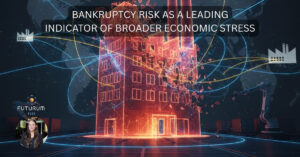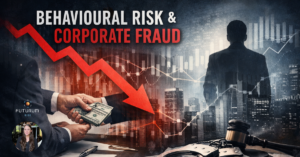At Futurum Risk, we know that trust is the currency of the financial sector. Yet trust is fragile, and in environments where billions move every second, the risks of fraud, corruption, insider trading, and misconduct are never far away. Whistleblowing is more than a regulatory requirement; it is the silent alarm system that prevents cracks from collapsing.
Our latest blog explores why whistleblowing frameworks are critical for financial institutions, the hidden costs of silence, and the cultural advantages of getting it right. We also look at the four essential pillars of an effective whistleblowing system, and why training and leadership are key to turning policies into protection.
Whistleblowing in Finance: The Silent Alarm That Protects Trust
A Choice in the Shadows
Picture this: you’re sitting at your desk in a financial firm. The room hums with quiet intensity, traders are glued to screens, analysts are crunching numbers, and compliance officers are chasing deadlines. Then, in the blur of data, something feels off. A trade looks suspicious, an invoice doesn’t add up, or a senior colleague makes a decision that seems self-serving rather than client-focused.
Do you raise your hand, or do you stay silent?
That crossroads moment is what whistleblowing is about. In the financial world, where trust is as valuable as capital, whistleblowing is not just a policy requirement. It is the silent alarm system that can stop a crack from becoming a collapse.
Why Finance Needs Whistleblowing More Than Most
Financial institutions sit at the centre of the global economy. With billions moving every second, the stakes are monumental. Unfortunately, so are the risks. The financial sector is uniquely vulnerable to fraud, insider trading, corruption, and conflicts of interest.
When these risks go unchecked, the consequences can be devastating:
- In 2022 alone, global financial institutions paid over $4 billion in compliance fines, much of it tied to misconduct and reporting failures.
- Research shows that 81% of investors would pull their money out of a company facing an ethics scandal, even if the firm was performing well financially.
- Scandals leave scars. A single high-profile failure can haunt a firm for decades, reshaping careers and weakening market position
It helps to imagine trust as a dam holding back millions of litres of water. One small crack may look harmless, but if no one speaks up, the pressure builds until the wall bursts. Whistleblowing is about spotting the crack early and fixing it before everything downstream is swept away.
The Heavy Cost of Silence
When whistleblowing systems are weak or absent, silence becomes dangerous. The lack of safe, confidential reporting channels forces employees into an impossible choice: protect their career by staying quiet, or risk retaliation by speaking up. Most, understandably, choose silence.
That silence is costly. Misconduct festers in the shadows until regulators, auditors, or journalists uncover it. By then, the damage was already public. At that point, companies are not just facing internal clean-up but external scrutiny, penalties, and reputational collapse.
Leadership also comes under fire. Even if executives were genuinely unaware of the wrongdoing, the absence of a reporting framework makes them appear complicit. Investors, regulators, and the public rarely distinguish between ignorance and negligence. In finance, perception is reality.
This isn’t hypothetical. In Hong Kong, a number of listed companies have missed deadlines for publishing financial statements because of unresolved internal disputes and misconduct linked to whistleblowing failures. These delays erode investor confidence and, in some cases, can suspend public trading altogether. In markets built on trust and speed, such setbacks are devastating.
The cost of silence is not limited to balance sheets or regulatory penalties. It infects culture. When staff see that speaking up is unsafe, they learn to look away. Wrongdoing becomes tolerated, then normalised. Over time, silence corrodes the ethical backbone of the organisation until integrity is no longer a value but a slogan.
A financial firm without whistleblowing is like a ship without lifeboats. You may cruise calmly in fair weather, but the moment a storm hits, there is no way to protect passengers or crew. Everyone goes down together.
The Payoff of Getting It Right
A strong whistleblowing system transforms risk into resilience. Some benefits include:
- Early detection of wrongdoing: Problems are identified before they grow.
- Improved stakeholder confidence: Investors and clients see integrity in action.
- A speak-up culture: Employees feel safe and respected when raising concerns.
- Protection for all: Both the firm and the whistleblower are safeguarded.
It is not only about preventing wrongdoing. Whistleblowing frameworks also demonstrate transparency, which is critical for ESG reporting. Shareholders increasingly demand proof that their values are upheld. Companies with robust whistleblowing processes score higher on governance metrics, and research shows that firms with strong speak-up cultures face fewer lawsuits and regulatory interventions.
It is the organisational equivalent of installing smoke alarms. You may never need them, but when sparks fly, they can save the house.
What Effective Whistleblowing Looks Like
An effective whistleblowing system is not built on slogans or half-measures. It rests on four strong pillars that support one another, each essential to building a culture where people feel safe and motivated to speak up.
1. Clear Policies
Policies are the foundation. They provide the rules of the game, defining what counts as wrongdoing and outlining the exact steps for reporting it. Without clear guidance, employees are left to guess: Is this behaviour serious enough to report? Who do I tell? What happens after I speak up?
Clear policies eliminate the fog. They spell out examples of misconduct, fraud, insider trading, conflicts of interest, harassment, and show staff that the company takes these issues seriously. They also map out the reporting journey so that no one feels lost once they decide to raise a concern.
Think of policies as the instruction manual for safety. Just as fire exits are labelled in a building, reporting routes should be clearly marked within a firm. If people know exactly where to go, they are far more likely to act.
2. Confidential Channels
Even with strong policies, employees will hesitate unless they feel truly safe. Confidential channels make that possible. These include hotlines, anonymous online portals, or secure reporting apps that protect the identity of the whistleblower.
The key here is accessibility. If reporting requires jumping through hoops or revealing your identity immediately, most employees will hold back. But when systems are designed to be simple and discreet, barriers dissolve.
Confidentiality also protects against the “hallway whisper” effect, where rumours of misconduct float around informally but never reach the people who can address them. A formal, trusted channel gathers those concerns in one place and allows leadership to respond constructively.
It is the organisational equivalent of a safe deposit box: you can place sensitive information inside, knowing it will be protected until the right people handle it.
3. Protection Against Retaliation
The greatest fear whistleblowers face is not being ignored, it is being punished. Retaliation can take many forms: demotion, exclusion, stalled promotions, or even outright dismissal. Without safeguards, speaking up feels like career suicide.
Effective systems must guarantee that this will not happen. Protection measures can include anonymous reporting, non-retaliation clauses in contracts, and strict consequences for managers who punish whistleblowers.
When staff see that retaliation is taken as seriously as the wrongdoing itself, trust grows. They understand that raising a concern is not an act of personal risk but an act of loyalty to the company’s integrity.
This protection turns whistleblowing from a lonely act of courage into a collective safeguard, where everyone knows the system has their back.
4. Trained Managers and Leaders
The final pillar is leadership. Even the best policies and channels will fail if managers mishandle reports. Training is critical to ensure that leaders respond fairly, consistently, and without bias.
A manager who dismisses a report as “not a big deal” sends shockwaves through the organisation. Others learn quickly that their voices will not be heard. Conversely, a manager who listens carefully, documents thoroughly, and escalates appropriately builds trust that ripples across teams.
Training equips leaders with both technical knowledge (how to follow procedures) and soft skills (how to listen with empathy, maintain confidentiality, and avoid prejudgment).
Managers are the first responders in the whistleblowing process. Like paramedics at the scene of an accident, their skill and attitude can make the difference between escalation and resolution.
Compliance Training: The Glue That Holds It Together
Compliance on paper is not enough. Policies may look neat in a handbook, but if staff do not know how to use them, they are as ineffective as locked fire exits.
This is why training is essential. In Hong Kong, where whistleblower protection laws are still evolving, firms cannot rely on government safeguards. They must build their own frameworks and educate their teams on how to use them. Training ensures:
- Employees understand their rights and responsibilities.
- Reports are handled consistently across the organisation.
- Firms stay aligned with expectations from regulators like HKMA, SFC, and the HKEX Corporate Governance Code, all of which stress robust whistleblowing frameworks.
Training is the fire drill that turns a compliance plan into real-world protection.
Building Trust Through Culture
Whistleblowing should never be treated as a box-ticking exercise. For financial firms, it represents three powerful commitments that reach far beyond compliance.
A Regulatory Expectation
Authorities across the globe, and increasingly in Hong Kong, expect firms to have clear whistleblowing systems in place. Regulators such as the HKMA, SFC, and the Hong Kong Stock Exchange’s Corporate Governance Code all highlight the importance of accessible reporting channels and protection mechanisms.
This is not just about following the rules. A robust framework demonstrates to regulators that a company is serious about transparency and accountability. It signals that leadership is proactive rather than reactive. Meeting these expectations reduces the risk of sanctions and builds credibility with both authorities and the market.
A Risk Management Tool
Whistleblowing acts as an early warning system. For leaders, it provides reassurance that if wrongdoing occurs, it will surface internally before regulators, journalists, or social media expose it to the world.
This makes whistleblowing a form of internal radar. Instead of discovering misconduct when it is already a full-blown crisis, management receives early signals and can act quickly. Early detection not only reduces potential fines but also limits damage to client relationships and market confidence.
In practical terms, whistleblowing gives firms the ability to clean their own house before outsiders arrive at the door. That control is invaluable in an industry where reputation is currency.
A Cultural Investment
Perhaps the most overlooked benefit is cultural. When employees see that concerns are taken seriously, a profound shift occurs. Whistleblowing becomes less about fear and more about pride, pride that the company values integrity enough to protect those who defend it.
This culture of openness builds trust between staff and leadership. It strengthens resilience because problems are surfaced and solved, not buried. And it protects reputation because stakeholders, employees, clients, and investors alike, know that ethical standards are more than just slogans.
Over time, firms with strong whistleblowing cultures attract and retain better talent, win greater loyalty from clients, and enjoy higher investor confidence. Culture is not an accessory; it is the engine that keeps integrity alive.
A Lighthouse in the Storm
Whistleblowing carries a complicated reputation. Some view it as disloyalty. Others see it as a last resort. In reality, it is neither. Whistleblowing is a lighthouse guiding firms away from dangers they may not see coming.
Handled poorly, silence allows misconduct to grow until it engulfs the firm in scandal, fines, and destroyed reputations. Handled well, whistleblowing becomes a force for transparency and resilience.
The next time you hear the word “whistleblower,” do not picture someone causing trouble. Picture the colleague who noticed the crack before the dam burst. Picture the lighthouse in a storm. Picture the silent alarm that saved not just a company, but the trust of everyone who believed in it.
Because in finance, trust is the currency. Whistleblowing is how you protect it.





